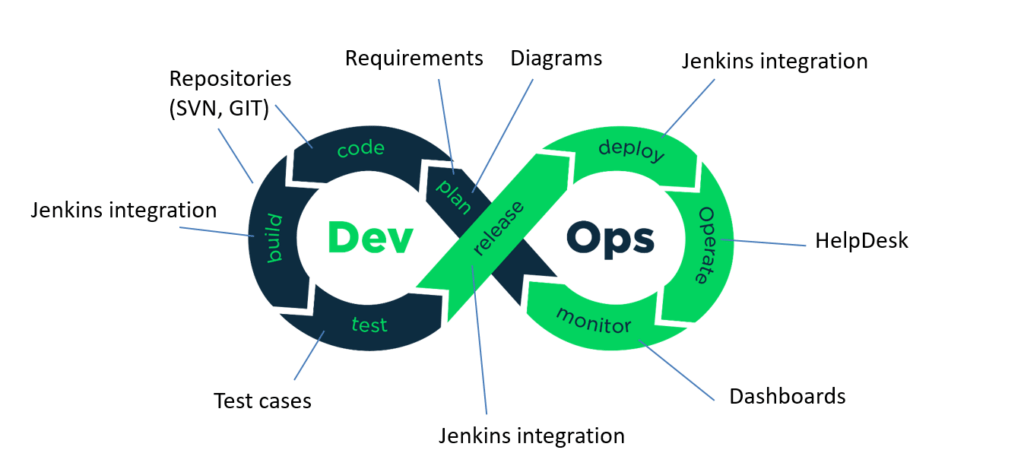The manager communicates with clients and gathers project requirements. The developer writes code. The tester documents bugs and the customer wants results as soon as possible. Everyone has responsibilities, but they share a common goal – delivering a great product. The client and the team need to be satisfied, and that’s where a DevOps engineer comes in.
In this article, you can learn more about DevOps engineering as well as get useful tips on how to start a DevOps career.
Who is a DevOps Engineer?
A DevOps engineer is a specialist who operates at the intersection of two crucial processes – product development and operations. Their primary objective is to select the right tools and establish effective collaboration among team members. With the right tools, developers can tackle tasks that previously required assistance from external experts.
Let’s illustrate this with a typical project involving front-end and back-end development. After an update to both parts of the system, the production environment experiences a sudden drop in performance. It triggers a lengthy investigation to determine what went wrong, why it happened, and how to fix it. DevOps professionals strive to prevent such issues from occurring, and in case problems arise, they leverage their knowledge of the product’s infrastructure to find solutions. By working with DevOps, programmers can focus on crafting program logic and completing tasks more efficiently.
A DevOps engineer is actively involved in all stages of the software development life cycle. They possess expertise in designing, developing, testing, deploying code, providing support, and monitoring projects. They aim to prevent bugs at each stage and enhance the efficiency and security of software development.

Ensuring that the code implements the required functionality to meet the client’s business needs is crucial. Ideally, the entire system should operate in a manner that allows users to quickly utilize new features while developers can make timely changes when necessary.

Types of DevOps Engineering
Due to the diversity of tools and the growing demand for DevOps specialists across various domains, several specializations have emerged:
- TechOps – system administrators like HelpDesk Engineer;
- LiveOps – sysadmins responsible for maintaining productive environments;
- CloudOps – administrators who manage systems built on cloud infrastructure and resource providers like Azure, AWS, GCP, and others.
- PlatOps/InfraOps/SysOps – system administrators of the infrastructure;
- NetOps – network administrators;
- SecOps – system administrators of information security (PCI compliance, CIS compliance, and patching).
DevOps courses typically offer comprehensive training programs that cover typical tasks in projects. However, there are cases where clients require DevOps engineers with a specific profile and a deep understanding of their business. On the other hand, there are situations where clients seek specialists with related knowledge who can handle multiple tasks simultaneously.
Learning DevOps from scratch: Where to Start
As a specialist, it’s crucial constantly exploring new areas and utilizing different tools. However, mastering these tools alone can be challenging, as DevOps revolves around managing complex project environments. In addition, you need to select appropriate technologies and effectively communicate with diverse individuals at each stage of development.
To successfully automate and support all processes, you need strong hard skills. For a DevOps engineer, receiving training in close collaboration with experienced professionals provides an opportunity to quickly grasp the subject matter and progress confidently in the chosen field. Developers who solve typical tasks stay updated on the latest trends. Learning the fundamentals of the DevOps methodology using real-life examples is much more effective. NIX experts, authors, and instructors of our free DevOps course employ a similar approach.
Alongside NIX experts you can learn about the key aspects of DevOps and Linux server administration. The training program is developed for students pursuing technical disciplines, system administrators seeking to change their career trajectory, and developers from other fields who want to delve into hardware-related concepts.
All requirements for the DevOps course can be found here.
Basic knowledge of Linux server configuration and a desire to acquire practical skills are sufficient. In the classroom, you will learn how to configure a mail server, host websites on Linux, optimize server performance, set up DNS, and perform backups. Teachers assess practical tasks based on real-life scenarios. The duration of the DevOps training at NIX is two months, and you should dedicate a full working day to your studies once a week.
Apart from the opportunity to learn alongside professionals, another advantage of studying at NIX is the potential to join the team immediately after completing the course. The NIX team offers DevOps courses that include employment opportunities. During the interview process, experts will evaluate the level of knowledge and skills you have acquired. If you complete the course, you may get a position as a Junior System Administrator/DevOps at NIX.
What does DevOps Engineer Do, and Where to Look for a Job
DevOps specialists are frequently mistaken for sysadmins. The primary tasks of the latter usually remain consistent, involving daily responsibilities related to ensuring infrastructure and network performance and security. However, the scope of responsibility for DevOps engineers is much broader and diverse. Yesterday, you may have been preparing the infrastructure for code deployment, today you could be testing a program, and tomorrow you might be developing a new feature or configuring the CI/CD process. The tasks assigned to a DevOps engineer vary depending on the project’s stage.
When seeking a DevOps engineer career path, we recommend exploring various platforms such as online job boards, professional networking websites and specialized IT job portals. These platforms often feature job postings specifically targeting careers in DevOps. Additionally, networking within the industry, attending tech conferences, and engaging in relevant online communities can provide valuable insights and potential job leads.
Responsibilities of a DevOps Engineer
- infrastructure design;
- setting up, supporting, and managing cloud services.
- managing the configuration of work, test, and production servers;
- overseeing continuous integration of CI/CD processes ;
- configuring application migration to the cloud;
- infrastructure and application monitoring;
- managing software supply.
Graduates of the NIX DevOps course have numerous opportunities for professional growth and employment. DevOps roles are often available in B2C (business-to-consumer) service development projects. It includes industries such as mobile operators, banks, internet providers, and other mass consumer services.
NIX already has several open DevOps job positions. Don’t wait for the “perfect” moment – submit your resume now! Or enroll in the DevOps training program and improve your skills alongside experienced developers.
If you’re interested in exploring other NIX training programs, explore our ItsWAY service and choose your future profession from a wide range of popular IT areas.






